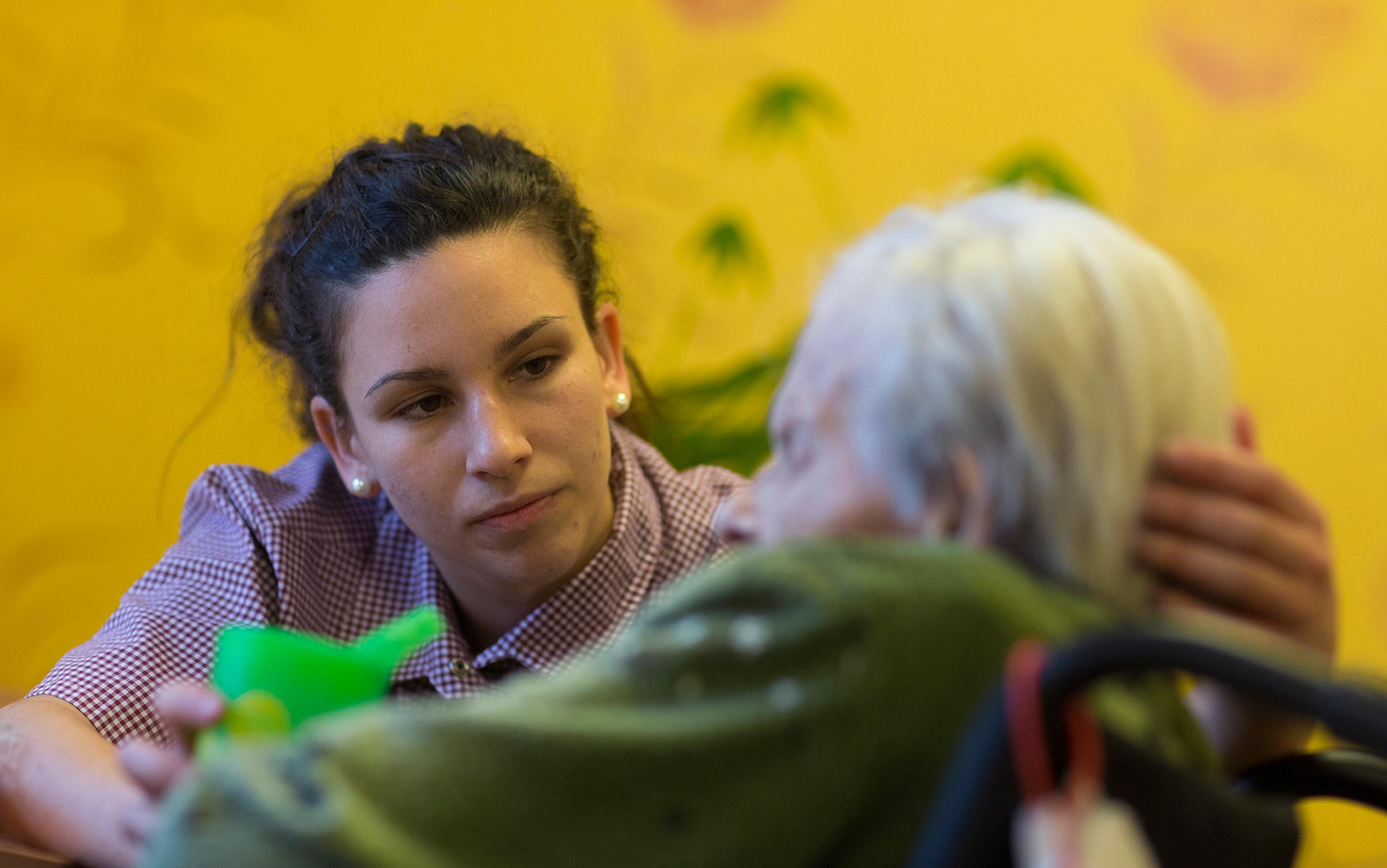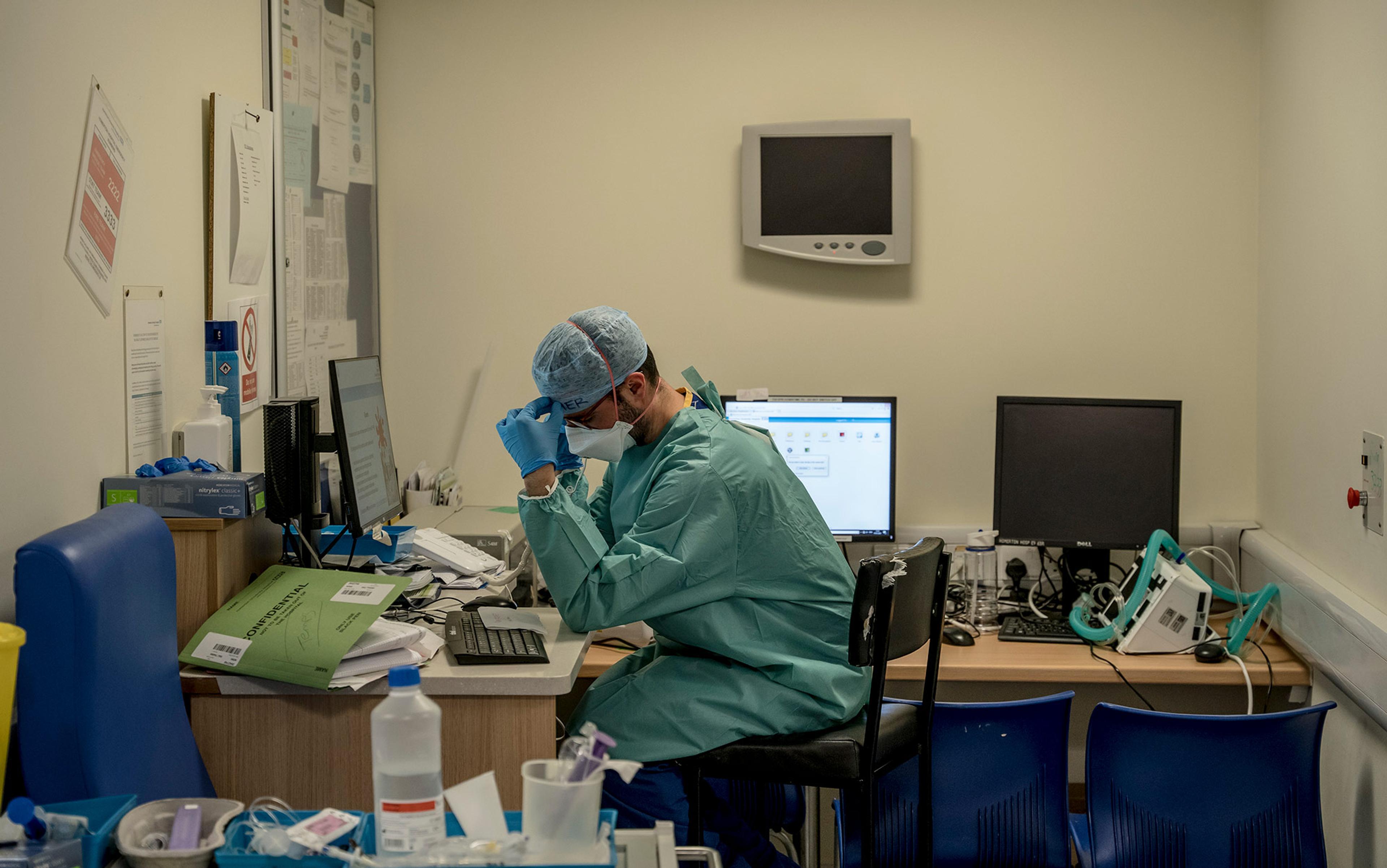Early last year, the World Economic Forum issued a paper warning that technological change is on the verge of upending the global economy. To fill the sophisticated jobs of tomorrow, the authors argued, the ‘reskilling and upskilling of today’s workers will be critical’. Around the same time, the then president Barack Obama announced a ‘computer science for all’ programme for elementary and high schools in the United States. ‘[W]e have to make sure all our kids are equipped for the jobs of the future, which means not just being able to work with computers but developing the analytical and coding skills to power our innovation economy,’ he said.
But the truth is, only a tiny percentage of people in the post-industrial world will ever end up working in software engineering, biotechnology or advanced manufacturing. Just as the behemoth machines of the industrial revolution made physical strength less necessary for humans, the information revolution frees us to complement, rather than compete with, the technical competence of computers. Many of the most important jobs of the future will require soft skills, not advanced algebra.
Back in 1983, the sociologist Arlie Russell Hochschild coined the term ‘emotional labour’ to describe the processes involved in managing the emotional demands of work. She explored the techniques that flight attendants used to maintain the friendly demeanours their airline demanded in the face of abusive customers: taking deep breaths, silently reminding themselves to stay cool, or building empathy for the nasty passenger. ‘I try to remember that if he’s drinking too much, he’s probably really scared of flying,’ one attendant explained. ‘I think to myself: “He’s like a little child.”’
Today, the rapid shrinking of the industrial sector means that most of us have jobs requiring emotional skills, whether working directly with customers or collaborating with our corporate ‘team’ on a project. In 2015, the education economist David Deming at Harvard University found that almost all jobs growth in the United States between 1980 and 2012 was in work requiring relatively high degrees of social skills, while Rosemary Haefner, chief human resources officer at the jobs site CareerBuilder, told Bloomberg BNA in January that corporate hiring this year would prize these skills to a greater degree than in previous economic recoveries. ‘Soft skills,’ she said, ‘can make the difference between a standout employee and one who just gets by.’
Across the economy, technology is edging human workers into more emotional territory. In retail, Amazon and its imitators are rapidly devouring the market for routine purchases, but to the extent that bricks-and-mortar shops survive, it is because some people prefer chatting with a clerk to clicking buttons. Already, arguments for preserving rural post offices focus less on their services – handled mostly online – than on their value as centres for community social life.
Historically, we’ve ignored the central role of emotional labour to the detriment of workers and the people they serve. Police officers, for example, spend 80 per cent of their time on ‘service-related functions’, according to George T Patterson, a social work scholar in New York who consults with police departments. Every day, officers arrive at families’ doorsteps to mediate disputes and respond to mental-health crises. Yet training at US police departments focuses almost exclusively on weapons use, defence tactics and criminal law. Predictably, there are regular reports of people calling the police for help with a confused family member who’s wandering in traffic, only to see their loved one shot down in front of them.
In the sphere of medicine, one of the toughest moments of a physician’s job is sitting with a patient, surveying how a diagnosis will alter the landscape of that patient’s life. That is work no technology can match – unlike surgery, where autonomous robots are learning to perform with superhuman precision. With AI now being developed as a diagnostic tool, doctors have begun thinking about how to complement these automated skills. As a strategic report for Britain’s National Health Service (NHS) put it in 2013: ‘The NHS could employ hundreds of thousands of staff with the right technological skills, but without the compassion to care, then we will have failed to meet the needs of patients.’
A growing real-world demand for workers with empathy and a talent for making other people feel at ease requires a serious shift in perspective. It means moving away from our singular focus on academic performance as the road to success. It means giving more respect, and better pay, to workers too often generically dismissed as ‘unskilled labour’. And, it means valuing skills more often found among working-class women than highly educated men.
The easiest place to see this shift is in medicine, where the overall healthcare landscape is changing to include more workers whose skills are primarily emotional. The US Bureau of Labor Statistics predicts that while jobs for doctors and surgeons will rise by 14 per cent between 2014 and 2024, the top three direct-care jobs – personal-care aide, home-health aide, and nursing assistant – are expected to grow by 26 per cent. None of these jobs requires a college degree, and together they already employ more than 5 million people, compared with the country’s 708,000 doctors.
Direct-care work is the quintessential job of the emotional labour economy. Sure, this work often demands physical strength – the ability to help a client with limited mobility bathe and get out of bed, for example. It might also call for some medical knowledge. But, as the education scholar Inge Bates at the University of Sheffield found in 2007, in ethnographic studies of direct-care trainees, the most significant skills required involve coping with filth, violence and death.
Bates studied a group of girls, aged 16, who entered a vocational training programme in preparation for work in homes for the elderly. These ‘care girls’, who had previously hoped to work with children, or in retail or office environments, were often horrified by the work. They described being hit by senile, confused residents, witnessing deaths, helping to lay out bodies, and coming into close contact with human waste. One trainee recalled finding a resident playing with her own faeces: ‘I had to scrub her hands and nails and get her nightie off and everything, and I sat her down and said, stay there, I’m just fetching your clothes, and when I came back she’d done it again and were [sic] playing with it again. You get you-know-what thrown at you … you have to learn to dodge it.’
And yet, over the course of the training programme, many of the workers came to take enormous pride in doing work that needed to be done, and that they knew many other people wouldn’t be able to handle. ‘By the second year of training, most desperately wanted to be care assistants and, when anyone got a job, it was a highly celebrated affair with a trip to the pub, even a party,’ Bates wrote.
It is becoming clear to researchers that working-class people tend to have sharper emotional skills than their wealthier, more educated counterparts. In 2016, the psychologists Pia Dietze and Eric Knowles from New York University found that people from higher social classes spent less time looking at people they passed on the street than did less privileged test subjects. In an online experiment, higher-class subjects were also worse at noticing small changes in images of human faces.
Waking to a crying baby or bathing an Alzheimer’s patient can be both gruelling and transcendentally life-affirming
In her 2007 study, Bates also found that class background seemed relevant to the care girls’ ability to do their jobs. Those who succeeded possessed skills they’d acquired growing up in working-class families, where as girls they took part in housework, caring for children and elderly relatives, and learned to be stoic in the face of heavy demands. ‘Clearly the experience of domestic work, serving others, denying their own needs (eg for regular sleep at night, for time off on Sunday) were demands to which these working-class girls were well-accustomed by the age of 16,’ Bates wrote.
Care work is both difficult and low-paid, yet the ‘psychic income’ of doing something worthwhile offers workers alternative compensations, according to Nancy Folbre, an economist at the University of Massachusetts, Amherst. Such work, after all, is the kind we’ve traditionally expected women to do for free – out of joyful beneficence. And, as much as we should recognise the deep harm that expectation has caused, it doesn’t mean the joy isn’t real. For men and women, paid and unpaid, waking at 3am to care for a crying baby or bathing a distressed Alzheimer’s patient can be gruelling and transcendentally life-affirming all at once.
It can be hard to wrap our minds around the notion that emotional work really is work. With the very toughest, very worst-paid jobs, like working with the dying and incontinent, that might be because those of us who don’t have to do the work would rather not think about how crucial and difficult it really is. In other settings, often we simply don’t have the professional language to talk about the emotional work we’re doing. Smiling and nodding at a client’s long, rambling story might be the key to signing that big contract, but resumes don’t include a bullet point for ‘tolerates inconsiderate bores’. A lot of the time, emotional labour doesn’t feel like labour. It’s also not hard to see that highly educated, mostly male, people who develop and analyse economic policy have blind spots when it comes to skills concentrated among working-class women.
Another problem is that the question of how to help low-wage care workers make more money is invariably answered by: ‘give them a better education’. Policy designers talk a lot about ‘professionalising’ direct-care work, advancing proposals for things such as ‘advanced training’ on diabetes or dementia care. Recently, Washington, DC decided to require childcare workers to have a bachelor’s degree – a move one school-district official said would ‘build the profession and set our young children on a positive trajectory for learning and development’. Granted, anyone working with older people with disabilities, or with small children, might benefit from studying research on the particular needs of these groups; and widely accessible college education is a good idea for reasons that go far beyond vocational training. But assuming that more time in the classroom is key to making ‘better’ workers fundamentally disrespects the profound, completely non-academic skills needed to calm a terrified child or maintain composure around a woman playing with her own faeces.
The US economists W Norton Grubb and Marvin Lazerson call the belief in more schooling as the solution to every labour problem the ‘education gospel’. As Grubb argued in a 2005 talk, having more education tends to help individuals find better work, but that doesn’t make schooling a good overall economic strategy. In fact, he said, 30 to 40 per cent of workers in developed countries already have more education than their jobs demand.
So far, the most-studied effort to train people in emotional skills is the drive to impart empathy to doctors. Over the past decade, medical schools and hospitals have taken note of a broad body of literature showing that when doctors can put themselves in their patients’ shoes, it leads to better clinical outcomes, more satisfied patients, and fewer burnt-out physicians. And there’s evidence this skill can be taught. A 2014 review found that communication training and role-playing boosted medical students’ and doctors’ empathy levels in eight of 10 high-quality studies.
Providing emotional skills training to prestigious, highly-paid, and highly specialised workers might be kind of obvious. Doing the same for the rest of us is a tougher proposition. But one sign of progress is the growing focus on ‘social and emotional learning’ (SEL) for schoolchildren.
SEL programmes in the US explicitly teach students strategies for developing empathy, managing their own emotions and working with others. Kids practise using affirming language with each other, they collaboratively design rules to govern the classroom, or use mindfulness to improve their understanding of their own mental processes. Researchers are finding that such programmes help students to adopt more positive attitudes and behave in more socially appropriate ways. Many school districts have already adopted SEL programmes, and last year, eight US states announced a collaboration to develop statewide SEL standards.
But the conversation around SEL puts a glaring spotlight on the limited value we place on emotional skills. Often, the programmes are marketed only as ways to reduce violence, not methods for developing crucial human abilities. And in academic environments where testing pressures and back-to-basics rhetoric often crowd out ‘softer’ subjects, they might appeal only insofar as they encourage kids to ‘get themselves under control’ and sit still for a long-division lesson.
An 80-hour working week can make it impossible for a doctor to be truly present with the person in pain
And here’s another thing. As valuable as formal training in emotional skills might be, it’s not at the heart of what makes people successful in emotional labour. Hochschild noted that ‘surface acting’ – creating the appearance of an appropriate emotion – is harder on workers and less effective than ‘deep acting’ – really summoning up those feelings. Spontaneously expressing genuine, appropriate emotion is, presumably, even better. In 2013, the British sandwich chain Pret A Manger came under fire for using mystery shoppers to ensure that its staff appeared constantly cheery. Service workers, of course, are expected to be friendly toward customers. But Pret A Manger’s secret monitoring of its own staff, to ensure unflagging cheeriness while also depriving them of the wages and working conditions that might encourage actual cheerfulness, came across as cynical and disingenuous. Besides, having to essentially fake an emotional connection can feel exploitative in ways that even the most painful physical labour is not.
At the other end of the pay scale, David Scales, a doctor at the Cambridge Health Alliance, points out that the current focus on training physicians for empathy misses ‘the glaring deficits in the work environment, which squelch the human empathy that doctors possess’. Facing an endless stream of patients, huge financial pressure to keep visits short, and 80-hour working weeks, doctors can find it impossible to be truly present with the particular person in pain sitting before them. As Bates found in her study of British care girls, Scales suggests looking at the tension between addressing people’s most pressing needs as quickly as possible within an overburdened system and really taking the time to care for them. Having some autonomy, being treated decently and not being overstressed all the time might be the biggest keys to being an effective emotional worker.
There’s an enormous opportunity before us, as robots and algorithms push humans out of cognitive work. As a society, we could choose to put more resources into providing better staffing, higher pay and more time off for care workers who perform the most emotionally demanding work for the smallest wages. At the same time, we could transform other parts of the economy, helping police officers, post-office workers and the rest of us learn to really engage with the people in front of us.
This isn’t something our economic system, which judges the quality of jobs by their contribution to GDP, is set up to do. In fact, some economists worry that we haven’t done enough to improve the ‘productivity’ of service jobs such as caring for the elderly the way that we have in sectors such as car manufacturing. Emotional work will probably never be a good way to make money more efficiently. The real question is whether our society is willing to direct more resources toward it regardless.
Technology-driven efficiency has achieved wonderful things. It has brought people in developed countries an astonishingly rich standard of living, and freed most of us from the work of growing the food we eat or making the products we use. But applying the metric of efficiency to the expanding field of emotional labour misses a key promise offered by technological progress – that, with routine physical and cognitive work out of the way, the jobs of the future could be opportunities for people to genuinely care for each other.






